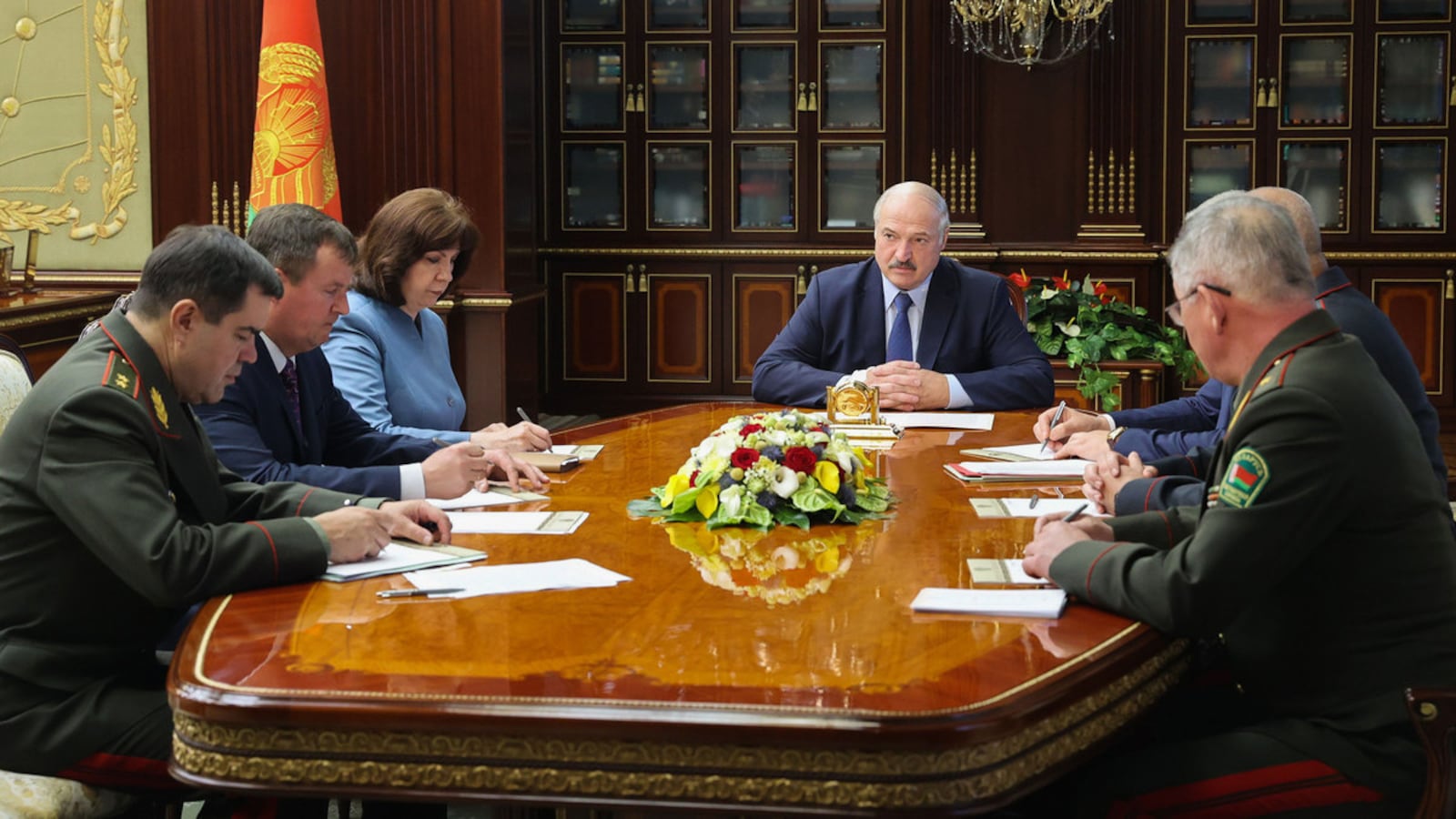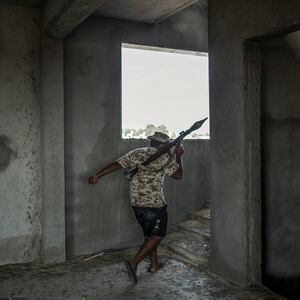Why is Russia’s closest international ally, Belarus, suddenly accusing Moscow of trying to infiltrate the country with military contractors to destabilize it ahead of its most contested election in decades?
On Wednesday, Belarus’ security service—still known as the KGB—announced that 200 militants had crossed the country’s open border with Russia and that it had arrested 33 of them.
The country’s president, Aleksandr Lukashenko, accused Russia—Belarus’ biggest economic trading partner—of making excuses to explain away its “dirty intentions” in an unusually strongly worded address given at a meeting with his security council in Minsk.
News footage of the arrests at a hotel on the outskirts of Minsk was distributed to state TV and broadcast nationally in a push to blame Russia for stoking unrest in its smaller neighbor to the west, which goes to the polls on Aug. 9.
Belarus 1 state television reported that hotel staff grew suspicious when the men did not behave like ordinary Russian tourists: “They did not drink alcohol, kept apart, and tried not to draw attention to themselves.”
The footage showed Belarusian special forces wrestling half-naked men to the ground in their hotel rooms, then displayed some of their personal items, which included condoms, cash, and a military-style patch with the slogan “our business is death and business is booming.” In another report Belarus 1 broadcast the photo pages of the arrested men’s Russian passports intercut with snapshots from their social media pages over ominous music.
This might all be bringing back flashbacks to 2014, when uniformed militants without national insignia who were later identified as Russian military personnel appeared throughout Ukraine’s Crimea peninsula in the aftermath of the EuroMaidan revolution that had left that country briefly rudderless. Russia used the discord of the moment as well as its military might to take Crimea, which it controls to this day.
Now, Belarus could be facing a similar moment of discord in a matter of days because of a hotly contested election the likes of which its president Lukashenko has never faced in his 26 years in power. The usually fractious opposition has gotten behind a single candidate, Sviatlana Tsikhanouskaya, the charismatic wife of jailed opposition leader Siarhei Tsikhanouski, who was not allowed to run. She has managed to gather rallies of thousands of people in towns and cities across the country, a feat previously unimaginable in this tightly run dictatorship. It’s a political earthquake for a country where competitive politics have been held on pause for over a quarter-century.
Whatever happens, be it a post-election crackdown on the opposition or a less likely transition of power to Tsikhanouskaya, the result will be some level of instability that a powerful neighbor could potentially take advantage of.
So has Belarus just prevented a Crimea-style Russian land-grab on its own territory? After all, Russia is believed to be using military contractors to further its geopolitical goals in countries such as Ukraine and Syria, and throughout Africa. And one of Moscow’s longest-standing goals has been an ever closer union with Belarus, with which it already has an EU-style open border.
Belarus watchers have their doubts. For one thing, “the issue of militants or the involvement of foreign countries or conspiracies are always invoked” by the authorities during any kind of crisis to justify restricting political freedoms, Valiantsin Stefanovich of the Viasna human rights center told the Russian-language Current Time newscast on Wednesday.
Then on Thursday, like clockwork, Belarus’ state news agency Belta reported that investigators there suspect the mercenaries might be connected to Tsikhanouskaya’s detained husband Siarhei and authorities promptly charged him and another opposition figure with attempting to foment riots. But any connection to Russia seems unlikely given Tsikhanouski’s politics.
For another, there is a plausible explanation for what the arrested Russian military contractors could have been doing in Belarus besides stirring up trouble for Lukashenko. According to Zakhar Prilepin, a Russian author who has boasted of killing “many” while fighting in eastern Ukraine, some of the men were indeed military contractors he has fought alongside there. But, he said in a post on Facebook, he believes they were likely traveling through Belarus on their way to another country.
This is the position Russia’s ambassador to Belarus has taken, stating that the contractors had to stay in a hotel because they missed their flight out of Minsk, which makes sense when you take into account the fact that Russia has restricted international flights for the coronavirus pandemic and some of the personal items broadcast on state TV after the arrests included what appeared to be currency from Sudan and a Muslim religious text.
What makes less sense is Lukashenko’s sudden willingness to see relations with Russia take such a dangerous turn. The embattled president seems to be taking a calculated risk as he faces the prospect of Western economic sanctions he cannot afford in the event he uses security forces to suppress mass protests, Belarus Security Blog analyst Andrei Paratnikau, told The Daily Beast.
“Lukashenko needs to show the West that the repressions he intends to carry out are a necessary evil if they don’t want to have to deal with Putin in Belarus instead of Lukashenko.”
And the wily president who has managed to cling to power longer than any other leader in Europe may find just a receptive audience there.







